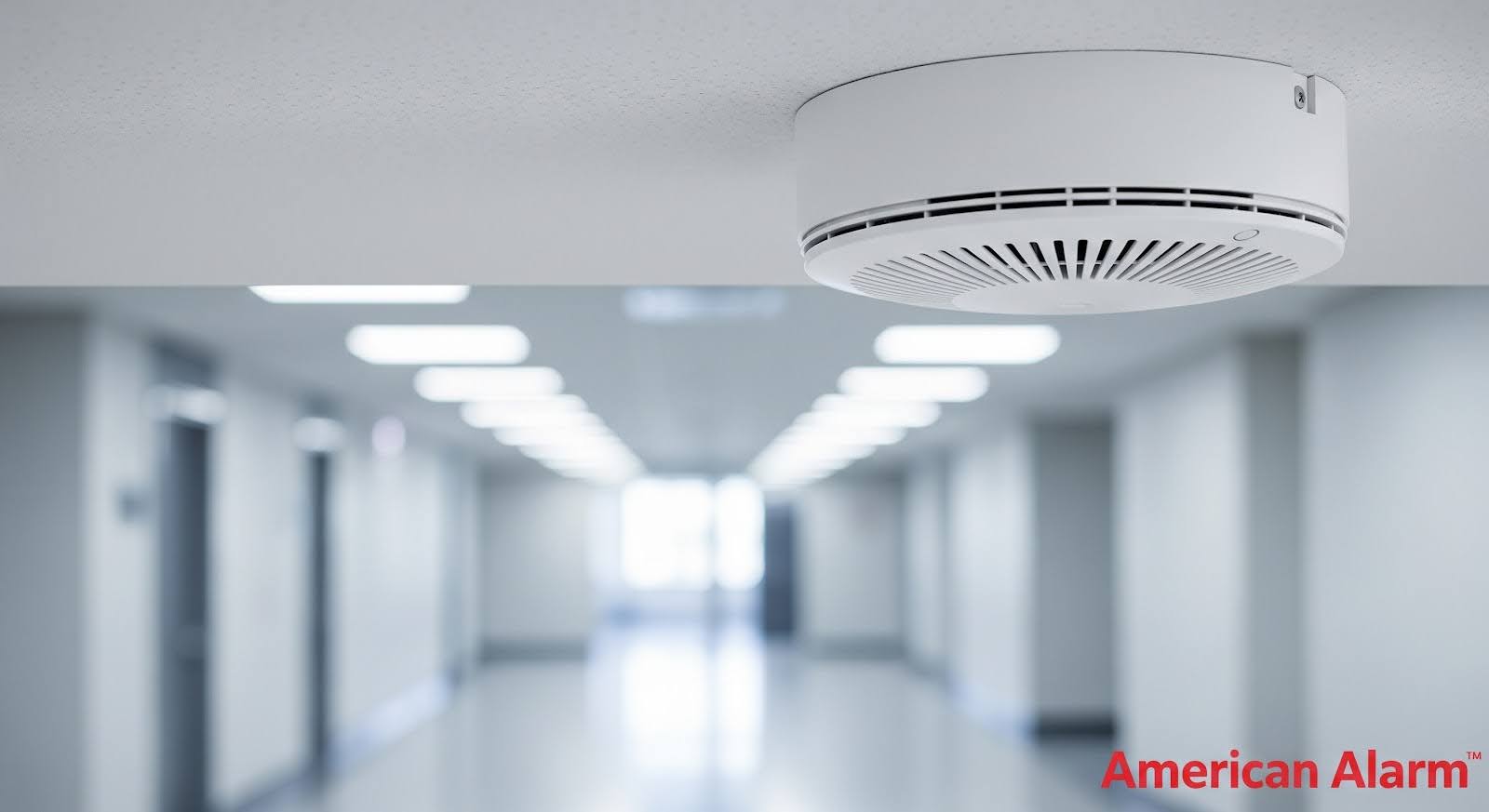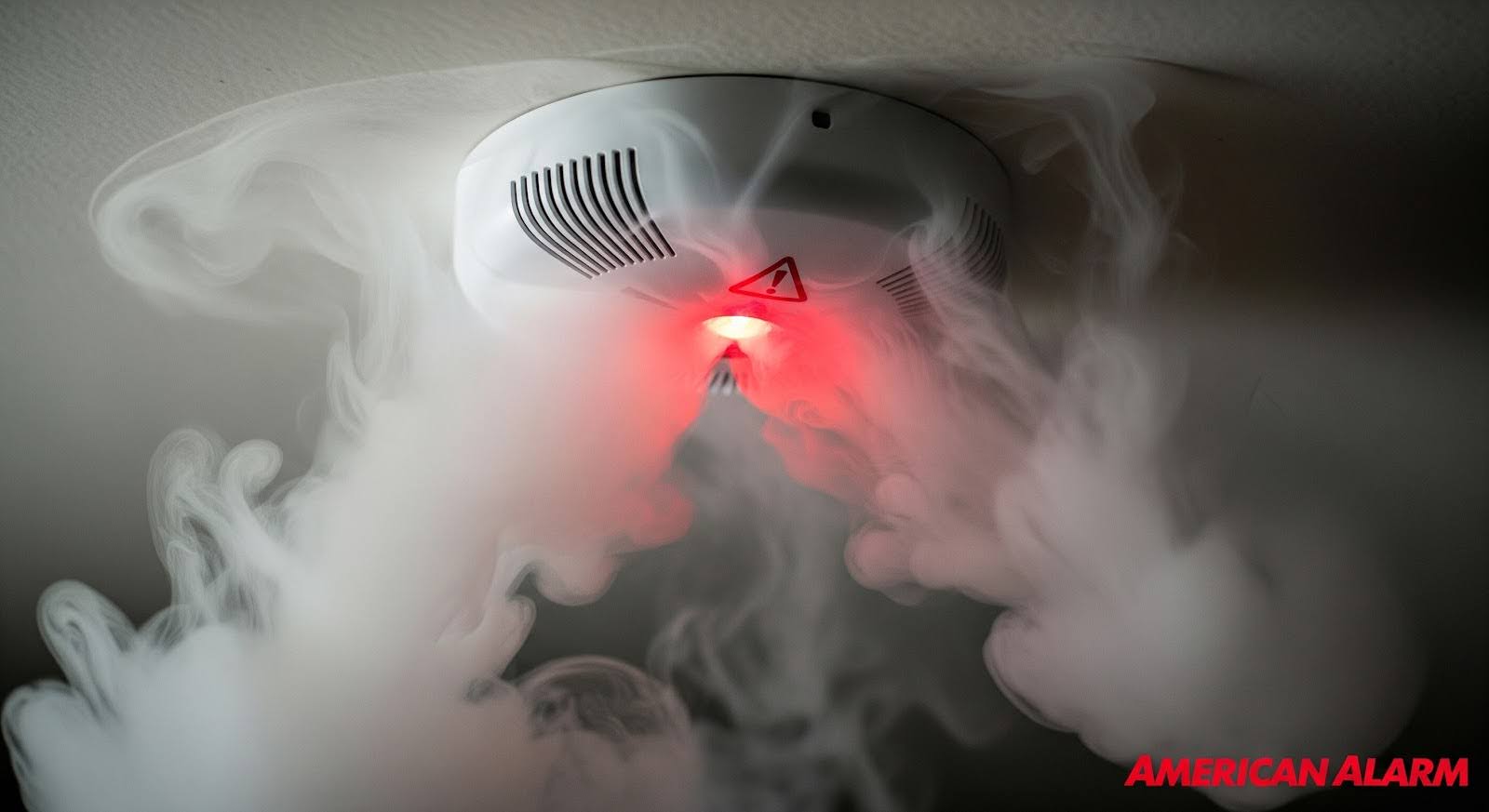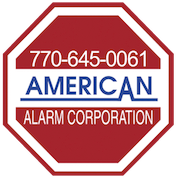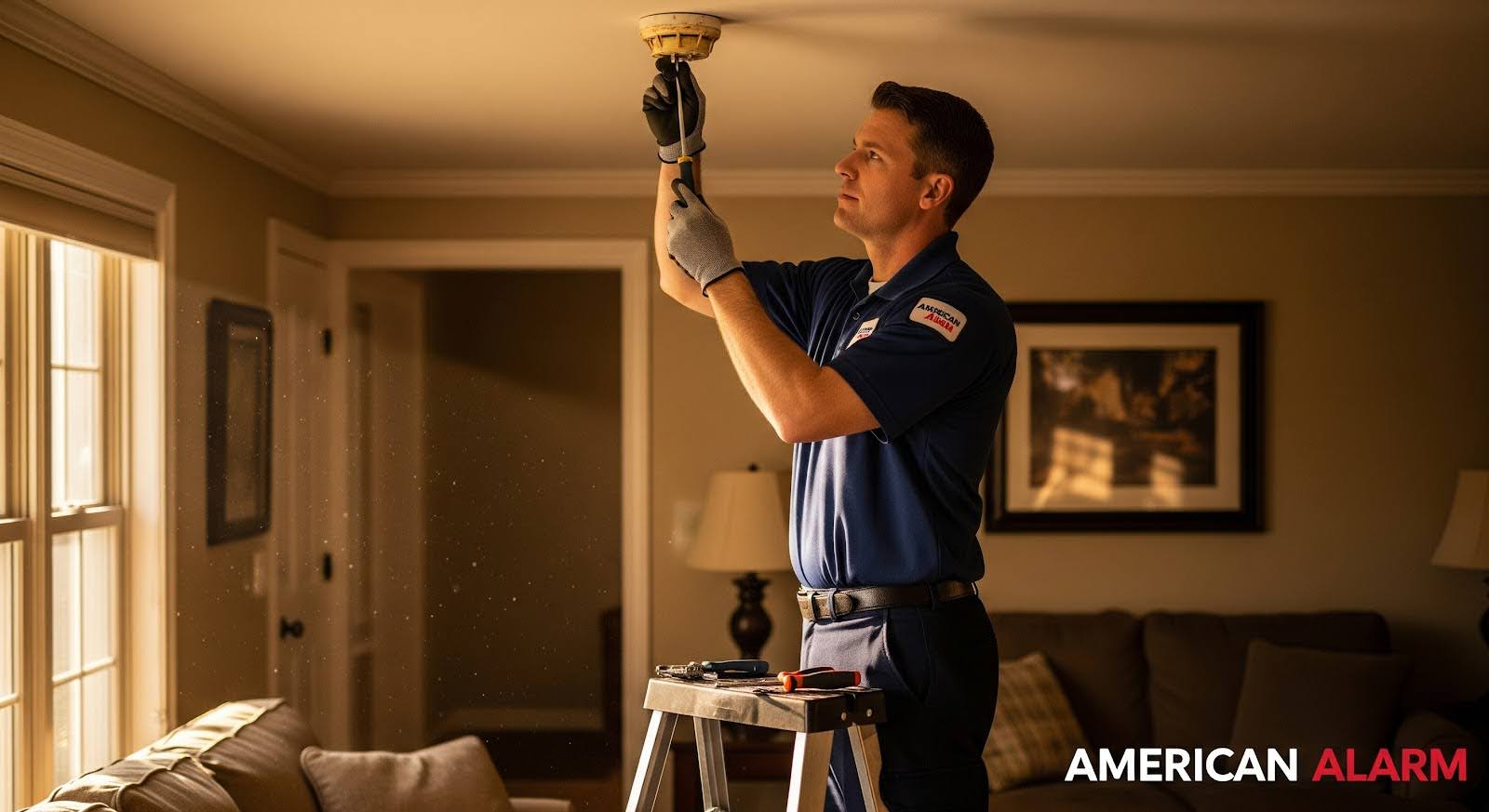Why Do Fire Alarms Need to Be Replaced Every 7–10 Years?
Key Takeaways
- Fire alarm and smoke detector sensors degrade over time, losing sensitivity after 7-10 years.
- The National Fire Protection Association (NFPA) mandates replacement to ensure reliability.
- Outdated alarms increase the risk of system failure, false alarms, and potential liability issues.
- Professional replacement is crucial for hardwired systems to meet Georgia fire codes and ensure proper function.
The Hidden Danger: How Fire Alarm Sensors Degrade Over Time
A fire alarm mounted on the ceiling can easily be forgotten, silently standing guard day after day. However, it’s a mistake to think of it as a simple plastic box that lasts forever. Inside every smoke detector is a sophisticated electronic sensor, and just like any other piece of technology, it has a finite lifespan. Over time, these critical components wear out, gradually losing their ability to detect a fire.
Most alarms use one of two sensor types:
- Ionization Alarms: These are best at detecting fast, flaming fires. They contain a tiny amount of radioactive material between two electrically charged plates, which creates a small, constant current. When smoke particles enter the chamber, they disrupt this current, triggering the alarm.
- Photoelectric Alarms: These excel at detecting smoldering, smoky fires. They use a light source aimed away from a sensor. When smoke enters the chamber, it scatters the light, causing some of it to hit the sensor and sound the alarm.
Both types of sensors are susceptible to degradation. Environmental factors like dust, humidity, airborne grease particles, and even insects can contaminate the sensing chambers. More importantly, the electronic components simply age, leading to a decline in sensitivity. This failure is gradual and completely invisible, meaning an outdated alarm might look perfectly fine but fail to function in an emergency.
Understanding NFPA 72 and Georgia Fire Code Requirements
The 7 to 10-year replacement rule isn’t just a suggestion from manufacturers—it’s a critical safety standard mandated by the National Fire Protection Association (NFPA). Specifically, NFPA 72, the National Fire Alarm and Signaling Code®, states that all smoke alarms must be replaced within 10 years from their date of manufacture.
This code is the benchmark for fire safety across the country and is adopted by state and local authorities, including those overseeing Atlanta and the state of Georgia. For business owners and commercial property managers, adhering to this standard is non-negotiable. Compliance is essential for passing fire inspections, maintaining business liability insurance, and most importantly, ensuring the safety of employees and customers. Failing to replace expired devices can lead to failed inspections, fines, and significant legal exposure. American Alarm provides NFPA-compliant fire alarm services to ensure your property meets every requirement.

4 Signs It’s Time for a Fire Alarm Replacement
Besides checking the manufacturing date on the back of the unit, your fire alarm system may give you clear warning signs that it’s reaching the end of its life. If you notice any of the following issues, it’s time to schedule a professional inspection.
Constant False Alarms
While a false alarm can be triggered by cooking smoke or steam, frequent and unexplained alarms are a red flag. As sensors degrade, they can become overly sensitive or malfunction, leading to nuisance alarms that disrupt your home or business operations.
Frequent, Unstoppable Chirping
Everyone is familiar with the intermittent chirp of a low battery. However, if you’ve replaced the battery and the unit continues to chirp persistently, it often indicates a more serious internal fault or component failure. This is the alarm’s way of signaling that it can no longer be trusted. If you’re experiencing this, it may be time for expert alarm repair services or a full replacement.
Yellowing or Discolored Casing
The plastic housing on older smoke detectors can turn yellow or brown over time due to exposure to UV light and bromine in the plastic. While this may seem like a cosmetic issue, it’s a visible indicator of the device’s age. If the outside looks that old, the internal sensors are certainly past their prime.
Failure to Respond During a Test
You should be testing your smoke alarms monthly by pressing the “test” button. If an alarm fails to sound, or if interconnected alarms don’t all go off together, there is a definite problem. It could be a dead battery, but if a new battery doesn’t solve it, the unit has likely failed and needs immediate replacement.
The Risks of an Outdated Fire Alarm System
Ignoring the replacement deadline for your fire alarms is a gamble with serious consequences. The most catastrophic risk is complete failure—an old, insensitive alarm may not detect a fire in time, or at all, robbing occupants of the precious seconds needed to escape safely.
For commercial property owners in the Atlanta area, the risks extend into legal and financial realms. In the aftermath of a fire, insurance companies will investigate the cause and the state of the building’s safety systems. If it’s discovered that the fire alarms had expired, your claim could be denied, leaving you with the full financial burden of recovery.
Furthermore, liability is a major concern. If an injury or death occurs during a fire on your property and the alarm system is found to be non-compliant, you could face devastating lawsuits. Protecting your assets and people starts with comprehensive commercial security solutions for businesses, and a functional fire alarm system is the cornerstone of that protection. When it comes to safety, there is no room for compromise.

Why Professional Replacement is Non-Negotiable
While changing the batteries in a smoke detector is a simple task, replacing a hardwired unit or an entire system is not a DIY project. Modern safety standards require alarms to be interconnected, so when one sounds, they all sound. This involves working directly with your property’s electrical wiring, which can be dangerous and should only be handled by a licensed professional.
A professional ensures that your new Atlanta fire alarm systems are installed correctly and meet all local Atlanta-area codes. Technicians understand the complexities of placement, wiring, and integration with a central panel and 24/7 fire alarm monitoring. An expert installation guarantees that every component of your system works together seamlessly, from smoke and heat detectors to access control systems that can unlock doors in an emergency.
Choosing a professional service like American Alarm is an investment in safety, compliance, and peace of mind. There are many reasons why you should choose American Alarm, but our commitment to protecting what matters most is at the top of the list. Don’t leave your safety to chance. You can always learn more on our blog about how our complete security services can help.
Ensure Your Atlanta Property is Protected
Don’t gamble with outdated equipment. If your fire alarms are approaching their expiration date, protect your family, employees, and assets with a professional assessment from American Alarm. Get a quote today.
FAQs
How do I check the age of my fire alarm?
To find the age of your alarm, gently detach it from its mounting bracket. On the back, you will find a label with the date of manufacture. The unit should be replaced 10 years after this date, or by the “replace by” date if one is listed.
Do all smoke detectors and fire alarms really expire?
Yes. All smoke and fire detection devices have a limited lifespan because their internal sensors degrade over time. Whether battery-operated or hardwired, they must be replaced every 7-10 years to remain effective.
Is replacing a hardwired smoke detector a DIY job?
We strongly advise against DIY replacement for hardwired alarms. It involves working with your property’s electrical wiring and requires knowledge of local fire codes to ensure all units are interconnected and functioning properly. For safety and compliance, always use a licensed professional.
What’s the difference between a smoke detector and a fire alarm system?
A smoke detector is typically a single, standalone device that sounds an alarm when it detects smoke. A fire alarm system is a more complex, interconnected network of devices—including smoke detectors, heat detectors, and pull stations—that is common in commercial buildings and often monitored 24/7.





Leave a Reply
Want to join the discussion?Feel free to contribute!